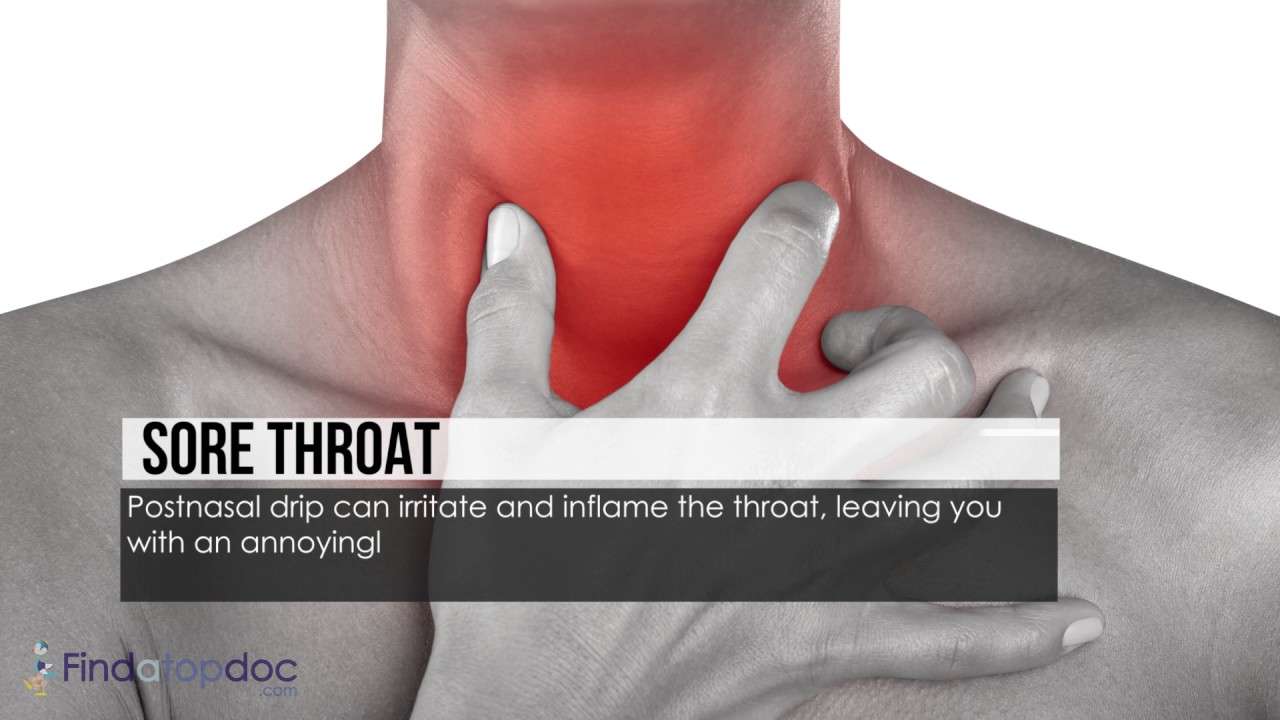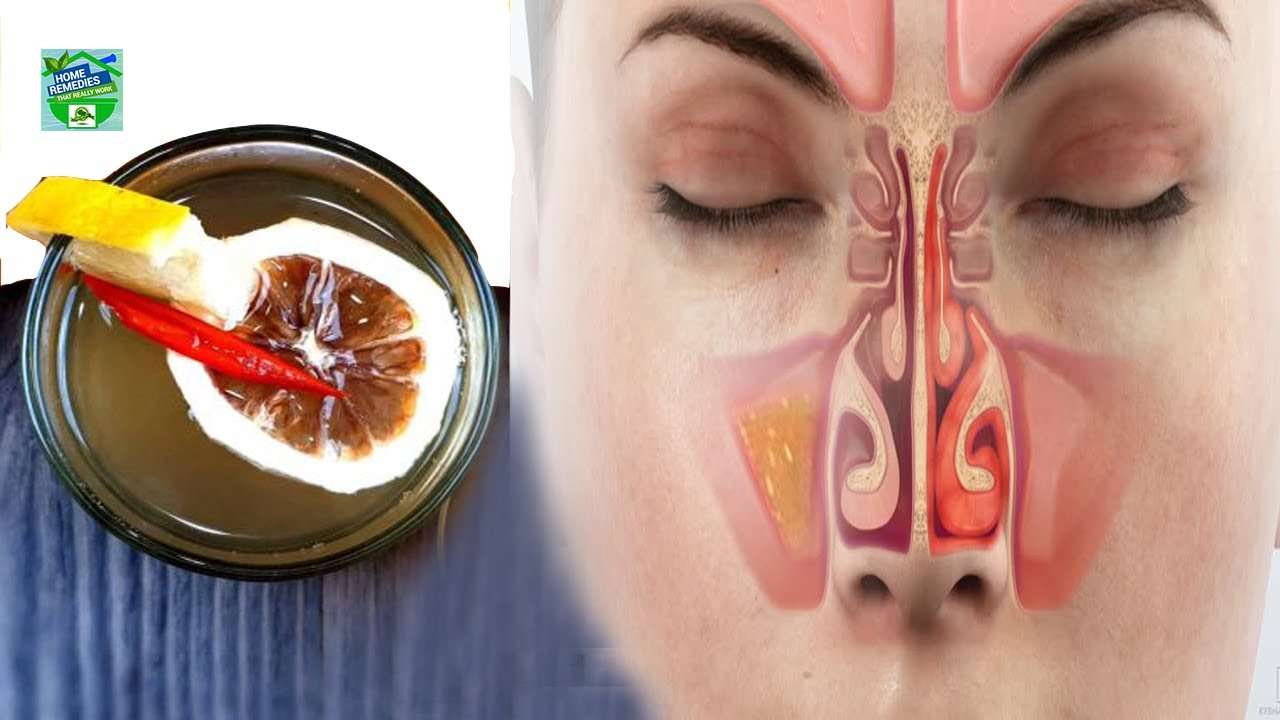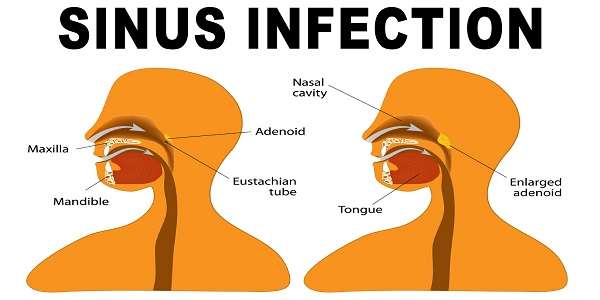Lingering Sinus Infection Or Chronic Runny Nose
A lingering sinus infection is different from a chronic runny nose. Chronic runny nose typically comes from allergies or other irritants in the air. However, this can turn into an infection over time.
When the sinuses become infected, the allergies, irritants, or viral cold have caused swelling in the nose thats blocked the drainage pathways. Consequently, fluid and mucous accumulate in the sinuses, where it has become infected with bacteria.
If youve been sick more than 10 days and begin to experience other symptoms like facial pressure, headache, and fever, youre dealing with more than a chronic runny nose.
Diagnosing A Sinus Infection
Since you cant tell if an infection is viral or bacterial just from looking at the symptoms, your surgeon will most likely run a few tests to diagnose the problem before recommending treatment. Diagnosing the infection can involve imaging to examine the sinuses and a mucus culture. Taking a sample of mucus from the nose or sinuses will help your surgeon determine if a bacteria is to blame and, if so, what type of bacteria is responsible. Knowing the type of bacteria thats causing your infection allows your surgeon to prescribe the type of antibiotic that would be most effective in treating it.
Related Conditions And Causes Of Sinus Infections
Colds, allergies, and sinus infections can cause similar symptoms, including stuffiness and headache. What’s more, both colds and allergies can cause sinus inflammation. So how can you tell the difference between these illnesses?
The truth is, even doctors can sometimes have difficulty differentiating among colds, allergies, and sinus infections. But the illnesses do present differently.
A hallmark sign that you have a sinus infection is that the illness is, as you’d expect, severely affecting your sinuses. Both colds and allergies can cause congestion and runny nose, but sinus infections typically cause an aching sensation and pressure in the face, including in the ears and teeth.
Additionally, postnasal drop, reduced sense of smell, and halitosis are typically associated with sinus infections.
The mucus associated with a sinus infection is usually green or yellow, though color alone isn’t enough to determine the cause of your nasal distress, as there are many reasons your nasal discharge may not be clear.
Both allergies and colds can cause sneezing, a symptom not typically seen in sinus infections. Allergies never cause fever, which is seen in both colds and sinus infections.
And if your symptoms last more than 10 days, you most likely don’t have a cold.
You May Like: How To Unclog Ears With Sinus Infection
Runny Nose And Postnasal Drip
When you have a sinus infection, you may need to blow your nose often because of nasal discharge, which can be cloudy, green, or yellow. This discharge comes from your infected sinuses and drains into your nasal passages.
The discharge may also bypass your nose and drain down the back of your throat. You may feel a tickle, an itch, or even a sore throat.
This is called postnasal drip, and it may cause you to cough at night when youre lying down to sleep, and in the morning after getting up. It may also cause your voice to sound hoarse.
How Do You Know If You Have A Sinus Infection

Ask U.S. doctors your own question and get educational, text answers â it’s anonymous and free!
Ask U.S. doctors your own question and get educational, text answers â it’s anonymous and free!
HealthTap doctors are based in the U.S., board certified, and available by text or video.
Recommended Reading: How To Use Saline Solution For Sinus
Chronic Sinus Infection Treatment
Chronic sinus infections typically have a more mysterious cause than acute infections people with chronic sinus infections often require life-long treatment to keep symptoms at bay.
In addition to the options above, treatment for chronic sinus infections may include:
- Lifestyle changes, such as quitting smoking and changing home or work conditions to reduce exposure to environmental toxins and allergens, such as dust mites, pet dander, or cockroaches
- Oral steroids
- Leukotriene modifiers, which reduce inflammation through a different mechanism than steroids
- Surgery to reopen sinuses affected by issues like nasal polyps and deviated septum
Recent research suggests other treatment options may also exist for chronic sinus infections, including:
- Nasal probiotics of the beneficial bacteria lactobacilli
- The drug dupilumab, derived from a human antibody, which the Food and Drug Administration approved to treat chronic sinus infections with nasal polyps in 2019
- A regime combining oral and intranasal corticosteroid irrigations
What Are The Stages Of A Sinus Infection
Types Acute sinusitis usually starts with cold-like symptoms such as a runny, stuffy nose and facial pain. It may start suddenly and last 2 to 4 weeks. Subacute sinusitus usually lasts 4 to 12 weeks. Chronic sinusitus symptoms last 12 weeks or longer. Recurrent sinusitis happens several times a year.
Don’t Miss: Can You Overcome A Sinus Infection Without Antibiotics
Signs Of A Sinus Infection
A sinus infection is something you want to deal with right away to prevent it from escalating. However, its not easy to discern between the different symptoms and what they mean. After all, an infection manifests itself in a similar way to the flu or a cold, so you cant always act decisively.
With that in mind, here are some signs you have a sinus infection and should see an ear, nose and throat doctor.
When To See A Doctor
You dont necessarily have to see your doctor for your allergies. The exception is if youve never been diagnosed with allergies before or if your allergies seem to be getting worse.
You should also see your doctor if your OTC antihistamines arent working. They might recommend prescription medications instead. If your allergies have you particularly congested, they might also prescribe a .
Since sinus infections are caused by viruses, antibiotics dont generally help. However, if your symptoms worsen or last longer than two weeks, you should see your doctor for some relief.
Read Also: Over The Counter Sinus Medication
Sinus Pain & Pressure
One of the more debilitating signs of a sinus infection, notably if its chronic, sinus pain includes headaches, pressure in the cheeks and eyes, and dental pain. It feels as though an invisible force is pressing on your face with a sledgehammer, using an extraordinary amount of pressure. Now try to be productive. A warm compress or inhaling steam from a shower can help with this.
Signs Of Sinus Infection
If you are experiencing a sinus infection, you may have some or all of the most common symptoms listed below. But just because you only have one or two of these symptoms does not mean you do not have a sinus infection.
Its important to take inventory of your body, noting where you are experiencing pain or irritation, how severe your pain or irritation is, and how you are feeling in general. Once you have self-monitored for a short time, youll know if your sinus infection is something you can treat at home or if its time to see a doctor.
Recommended Reading: If Sinus Infection Is Left Untreated
Warning Signs Of A Dangerous Sinus Infection
Sinus infection or sinusitis is common. Many times it is mild and rarely causes complications. Even sometimes it will get better in time with nothing more than enough rest and fluid. However if its complications have occurred, some could be dangerous or even life-threatening. Thats why its also important to understand the warning signs and when to seek immediate medical help!
How Is Sinusitis Diagnosed

Your healthcare provider will ask you a lot of questions in order to develop a detailed medical history and find out about your symptoms. They will also do a physical examination. During the exam, your care provider will check your ears, nose and throat for any swelling, draining or blockage. An endoscope may be used to look inside the nose. In some cases, you might be referred to an ear, nose and throat specialist. If you needed an imaging exam, your provider would order a computed tomography scan.
Don’t Miss: Medicine That Helps With Sinus Infection
What Your Doctor Needs To Know
To find out if youâve got more than a bad cold, you need to learn the cause of your symptoms. Your doctor can help you figure out whether you have sinusitis or something else.
Tell your doctor how long youâve had sinus symptoms, and whether theyâve gotten worse or stayed the same. If youâve had them for less than 10 days and theyâre not getting worse, you probably have a viral infection. It will likely go away on its own.
Over-the-counter treatments like saline sprays, acetaminophen, or ibuprofen may help ease symptoms along the way. might reduce the swelling and inflammation temporarily. If you use them, read the directions carefully and only use as directed. Using nasal decongestant sprays for more than a few days could make the congestion worse.
Causes And Risk Factors Of Sinus Infection
The terms “sinus infection” and “sinusitis” are often used interchangeably, but sinusitis simply refers to the inflammation of the sinuses, with or without an infection. The medical term for sinusitis is rhinosinusitis because the illness affects the mucous membranes in both the sinuses and nose.
Sinus infections ultimately develop because of sinus and nasal blockages that result in sinus inflammation. There are several underlying causes of sinus blockage, including various environmental, anatomical, and genetic factors. But the most common cause of the blockage is inflammation or swelling of the nasal passages because of the common cold or allergies.
In healthy people, mucosal secretions are always moving and draining into the nasal cavity. But
when blockage occurs, mucus fails to drain properly, increases in thickness, and fills the sinus spaces.
The cilia also slow down their sweeping and cleaning, making it even harder for mucus to drain.
When the mucus is unable to drain, it becomes the perfect medium for microbes to grow out of control and cause an infection.
Recommended Reading: Sinus Pain Relief Pressure Points
About Author: Lisa Coon
Lisa Coon is a Writing Coordinator for OSF HealthCare, where she has worked since August 2016. A Peoria native, she is a graduate of Bradley University with a degree in journalism. Previously, she worked as a reporter and editor at several newspapers in Iowa and Illinois.She lives in Groveland with her husband and son. In her free time she likes to cook, bake and read. She freely admits that reality TV is a weakness, and she lives by the quote, The beach is good for the soul.
Clear Your Sinuses With Saline Spray
Saline nasal spray can rinse your sinuses without chemicals or medication. Its available at most grocery stores and pharmacies, but you can also make a saline nasal spray at home. Boil 8 oz. of water, then let it cool until warm. Add ¼ teaspoon of non-iodized salt and stir until dissolved. If youre experiencing a lot of congestion, increase the salt to ½ teaspoon. Pour the solution into a spray bottle and use it as needed. If your nose is sore and the solution stings, add up to a ½ teaspoon of baking soda. Discard the solution after two days.
Don’t Miss: Good Medicine For A Sinus Infection
Favorite Resources For Finding A Specialist
Through research, education, and advocacy, the American Rhinologic Society is devoted to serving patients with nose, sinus, and skull base disorders. Their website provides a valuable search tool to find a doctor, as well as links to other medical societies and resources that are useful for patients.
Sinus Infection Treatment In Will County And Dupage County Illinois
If youre experiencing symptoms of sinusitis, the experts at Oak Brook Allergists can help you find relief especially if you have chronic sinusitis. Our allergy and immunology physicians and specially-trained assistants work together to provide you with the relief you need.
Make an appointment today by calling 574-0460, or you may request an appointment online.
Read Also: How Do You Treat A Sinus Infection In Children
How Do You Get Rid Of A Bacterial Sinus Infection
An nasal decongestant spray, oral or topical antihistamines, nasal steroids, and nasal saline washes will relieve nasal inflammation caused by sinus infection. When antibiotics are not able to treat an infection, an antibiotic is usually prescribed. Still, be careful here. Antibiotics must be avoided if possible.
How Do You Know A Sinus Infection Is Bacterial

Read Also: Which Antibiotics Treat Sinus Infection
Sore Throat And Hoarse Voice
Postnasal drip can leave you with a raw and aching throat. Although it may start as an annoying tickle, it can get worse.
If your infection lasts for a few weeks or more, mucus can irritate and inflame your throat as it drips, resulting in a painful sore throat and hoarse voice. Frequent coughing and throat clearing can make a hoarse voice worse.
What Are Warning Signs Of A Dangerous Sinus Infection
If acute sinus infection is caused by viral infection, it is usually easy to treat or even will relieve on its own . Typically, it lasts a few days, 7-10 days, and then will get better. But if it is caused by bacterial infection, it is relatively more difficult to cope and usually will take one or some of the following paths:
Don’t Miss: Does Amoxicillin Help With Sinus Infection
Do I Have A Sinus Infection
Sneezes, coughs, stuffy nose and fever. Yep, its that time of year again when something is going around. You figure it’s just another cold, right? Maybe not. The problem could be your sinuses.
Acute sinusitis, also known as a good old sinus infection, can often accompany or follow a viral cold. And a lot of the symptoms you may experience with a cold including nasal congestion, sinus pain and postnasal drip are also common sinus infection symptoms.
So which is it? Because cold symptoms and sinusitis symptoms often overlap, it can be hard to figure out the underlying cause of your discomfort. Heres a quick visual guide to help you determine if you have a cold or if its turned into a sinus infection.
| Sinus Infection |
|---|
| Not likely |
Symptom Myth
Colored mucus whether green, yellow, or something in between doesnt tell us if a sinus infection is viral or bacterial. It does indicate that your bodys immune system is fighting something.
What Should You Eat When You Have A Sinus Infection
Vitamins and minerals Colorful fruits and vegetables like apricots, cantaloupe, strawberries, red and green peppers, kale, parsley and broccoli get high praise from the scientists working on sinus healers world-wide. They contain lots of vitamin C which is known to fend off colds, allergies and sinus infections.
Don’t Miss: Nasal Washes For Sinus Infections
Start Treating Your Symptoms Right Away
Since viruses cant be cured, treating colds is primarily aimed at improving symptoms.
Its important to remember that with colds and other viruses, taking an antibiotic wont help you feel better any faster, says Dr. Woodard. In fact, taking an antibiotic unnecessarily can do more harm than good.
The overuse of antibiotics can lead to antibiotic resistance, which can make subsequent infections more difficult to treat.
Get plenty of rest, stay hydrated and rinse out your sinuses with saline irrigation, which can help thin mucous and flush it from your nasal cavity, he says.
Sinus Infection Or A Toothache How To Tell The Difference Between The Two
You all of a sudden get sensitivity or pain in your teeth when you are chewing food and the first thing that comes to mind is, I have a cavity. However, because your body is so interconnected, what you may think is a cavity may actually be something as simple as a sinus problem. So, how can you tell the difference between these two? This article will discuss a few helpful tips to help you differentiate between each of these problems.
Read Also: Techniques To Relieve Sinus Pressure
How A Sinus Infection Is Diagnosed
The diagnosis of a sinus infection is usually based on symptoms and a physical exam. If your symptoms don’t improve with treatment, you may need X-rays or a CT scan. Sometimes a sample of sinus fluid may be taken for microscopic exam and culture .
Though not all sinus infections require treatment, early diagnosis and treatment can help you feel better sooner and potentially prevent the infection from progressing.